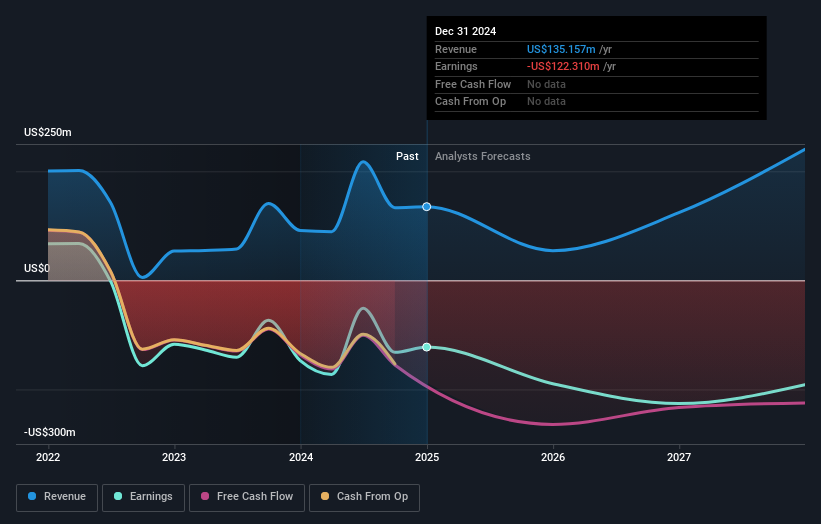Prothena Corporation plc (NASDAQ:PRTA) Just Released Its Yearly Earnings: Here's What Analysts Think
It's been a good week for Prothena Corporation plc (NASDAQ:PRTA) shareholders, because the company has just released its latest yearly results, and the shares gained 9.8% to US$15.56. Despite revenues of US$135m falling 3.8% short of expectations, statutory losses of US$2.27 per share were well contained, and in line with analyst models. Earnings are an important time for investors, as they can track a company's performance, look at what the analysts are forecasting for next year, and see if there's been a change in sentiment towards the company. So we collected the latest post-earnings statutory consensus estimates to see what could be in store for next year.
Check out our latest analysis for Prothena

Following the recent earnings report, the consensus from nine analysts covering Prothena is for revenues of US$54.5m in 2025. This implies a substantial 60% decline in revenue compared to the last 12 months. Per-share losses are expected to explode, reaching US$3.64 per share. Before this earnings announcement, the analysts had been modelling revenues of US$63.9m and losses of US$4.10 per share in 2025. So there's been quite a change-up of views after the recent consensus updates, withthe analysts making a serious cut to their revenue forecasts while also reducing the estimated losses the business will incur.
The consensus price target was broadly unchanged at US$50.00, implying that the business is performing roughly in line with expectations, despite adjustments to both revenue and earnings estimates. That's not the only conclusion we can draw from this data however, as some investors also like to consider the spread in estimates when evaluating analyst price targets. The most optimistic Prothena analyst has a price target of US$94.00 per share, while the most pessimistic values it at US$20.00. As you can see the range of estimates is wide, with the lowest valuation coming in at less than half the most bullish estimate, suggesting there are some strongly diverging views on how analysts think this business will perform. With this in mind, we wouldn't rely too heavily the consensus price target, as it is just an average and analysts clearly have some deeply divergent views on the business.
One way to get more context on these forecasts is to look at how they compare to both past performance, and how other companies in the same industry are performing. We would highlight that revenue is expected to reverse, with a forecast 60% annualised decline to the end of 2025. That is a notable change from historical growth of 32% over the last five years. Compare this with our data, which suggests that other companies in the same industry are, in aggregate, expected to see their revenue grow 21% per year. It's pretty clear that Prothena's revenues are expected to perform substantially worse than the wider industry.
The Bottom Line
The most important thing to take away is that the analysts reconfirmed their loss per share estimates for next year. Unfortunately, they also downgraded their revenue estimates, and our data indicates underperformance compared to the wider industry. Even so, earnings per share are more important to the intrinsic value of the business. Still, earnings per share are more important to value creation for shareholders. The consensus price target held steady at US$50.00, with the latest estimates not enough to have an impact on their price targets.
With that in mind, we wouldn't be too quick to come to a conclusion on Prothena. Long-term earnings power is much more important than next year's profits. At Simply Wall St, we have a full range of analyst estimates for Prothena going out to 2027, and you can see them free on our platform here..
It is also worth noting that we have found 2 warning signs for Prothena that you need to take into consideration.
Have feedback on this article? Concerned about the content? Get in touch with us directly. Alternatively, email editorial-team (at) simplywallst.com.
This article by Simply Wall St is general in nature. We provide commentary based on historical data and analyst forecasts only using an unbiased methodology and our articles are not intended to be financial advice. It does not constitute a recommendation to buy or sell any stock, and does not take account of your objectives, or your financial situation. We aim to bring you long-term focused analysis driven by fundamental data. Note that our analysis may not factor in the latest price-sensitive company announcements or qualitative material. Simply Wall St has no position in any stocks mentioned.
① During the campaign period, US stocks, US stocks short selling, US stock options, Hong Kong stocks, and A-shares trading will maintain at $0 commission, and no subscription/redemption fees for mutual fund transactions. $0 fee offer has a time limit, until further notice. For more information, please visit: https://www.webull.hk/pricing
Webull Securities Limited is licensed with the Securities and Futures Commission of Hong Kong (CE No. BNG700) for carrying out Type 1 License for Dealing in Securities, Type 2 License for Dealing in Futures Contracts and Type 4 License for Advising on Securities.

English